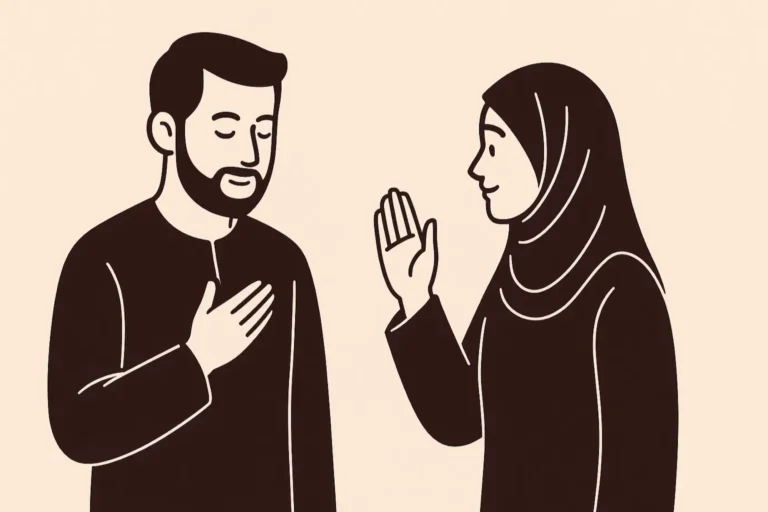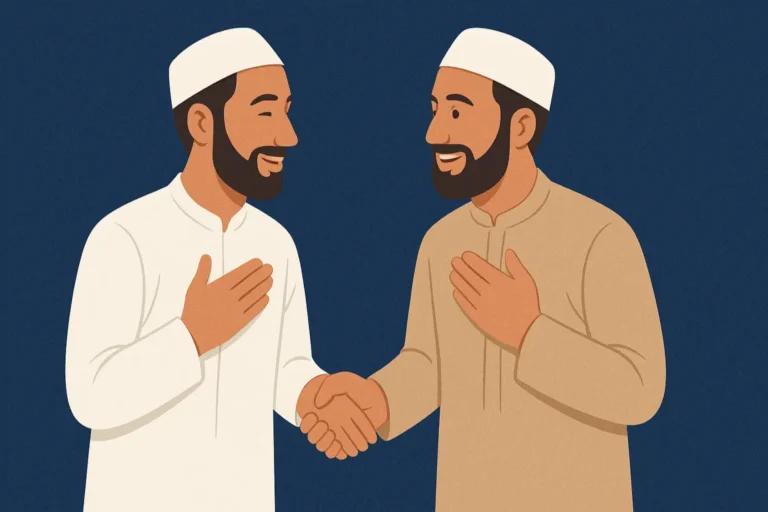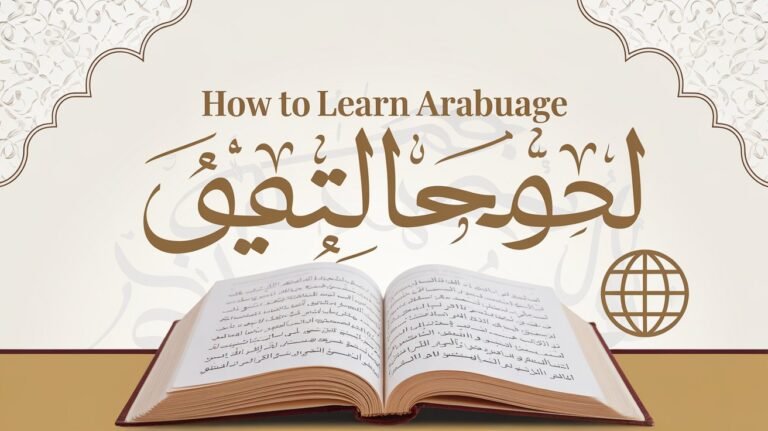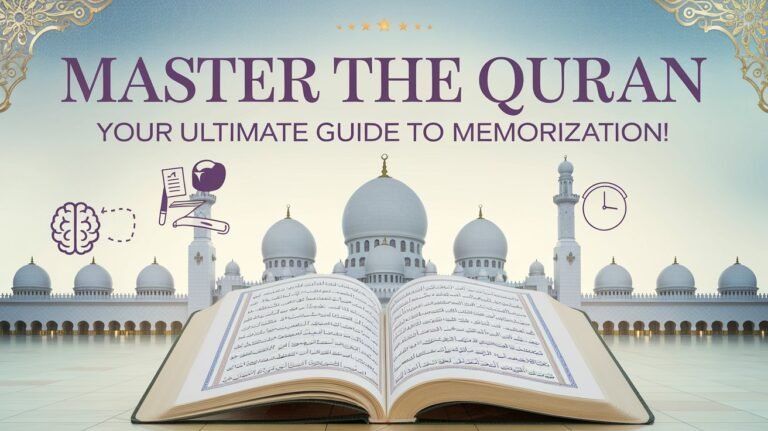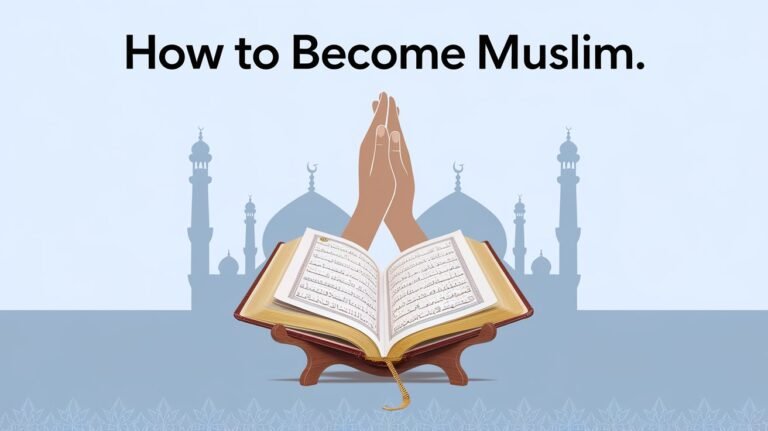The First Kalma, or Kalma Tayyaba is the first proclamation that makes a person a Muslim and outlines the direction towards which their whole life henceforth will be oriented.
When we uttered the words “La ilaha illallah, Muhammadur Rasulullah”, what we are declaring is the fundamental doctrine of Tawheed or the belief in the Oneness of Allah and the conclusion of the Prophethood of Muhammad ﷺ.
In Islam, the First Kalma is not simply words that one recites; it is an incredible truth that permeates the heart, mind, and soul of every believer.
When a person recites the Kalma with conviction he moves away from the realm of disbelief and enters into the illuminating light of Iman. That is why parents encourage children to recite these words from the earliest of years, so that it becomes their first lesson in faith.
The Prophet Muhammad ﷺ has characterized the Kalma as the greatest form of remembrance.
It stands like a talisman against doubts that might surely come our way, it bestows a sense of inner peace and it offers the possibility of Paradise. As a whole, history is replete with examples of people who have had a life changing transformation the moment they spoke the First Kalma.
A few people, become a lot like the First Kalma in that they stand as a living words indicating Islamic texts, indeed simple, pure and enduring.
What is the First Kalma?
The First Kalma, also known as Kalma Tayyaba, is the entrance to Islam. It is a short but complete and complete declaration of belief. In Arabic, it is written as follows:
لَا إِلٰهَ إِلَّا اللهُ مُحَمَّدٌ رَّسُولُ اللهِ
In English, the meaning is: “There is no god but Allah, and Muhammad is the Messenger of Allah.”
These words capture the essence of Islam. The first part states that no one is worthy of worship other than Allah. The second part states that Muhammad ﷺ is the last and final Messenger of Allah. In other words, the two halves serve as the foundation of a Muslim’s belief and practice.
This Kalma is not merely a statement to be memorized but is a whole world view. By accepting it, a person is recognizing that there is more to life than physicality or worldly benefit and that genuine guidance can only be through Allah and His Messenger ﷺ. It is this belief that ties a Muslim to their Creator and makes a clear divide between belief and disbelief.
Importance of the First Kalma in Islam
The First Kalma is the foundation of a Muslim’s belief. Every gaya of worship whether it is prayer, fasting, and charity springs from the First Kalma. Undoubtedly, if a person doesn’t acknowledge this first principle, then no matter what they do it will not hold any value in spiritual terms. It is the fundamental meaning to which everything pinned on.
This Kalma has identity attached to it too. Someone who volunteers for charity repeatedly could walk in to a room of non- Muslims and feel out of place, whereas a Muslim would stand out somewhat and become part of the group. By merely accepting that this is absolutely true, they become part of the Muslim community.
The belief becomes their identity; uniting thousands of people regardless of cultural or ethnic heritages or languages with a common belief – that Allah is the only one who deserves to be worshiped and that his message, the Prophet ﷺ is the last person to guide the people and show them the Message.
The Qur’an repeatedly emphasizes the principle of Tawheed, the Oneness of Allah. Verses such as “So know that there is no deity except Allah” (Qur’an 47:19) highlight its central role. The First Kalma reflects this eternal truth, reminding believers that their loyalty belongs only to the Creator.
This declaration also brings purpose and substance as it clarifies thought. The First Kalma liberates the heart and mind from confusion, is humbling to teach someone to put trust in Allah, and demonstrates resiliency through dark chapters of life. For the believers the First Kalma doesn’t just mark the initiation of faith, it is briefly the Compas of life and the the duty of sending action without cease (until the end of time) to getting every believer to find righteousness.
Hadith on the First Kalma
The sayings of the Prophet Muhammad ﷺ explain the unparalleled importance of the First Kalma. He referred to “La ilaha illallah” as the greatest remembrance.
In a narration reported by Tirmidhi, the Prophet ﷺ said: “The best remembrance is La ilaha illallah.”
These show that out of all that is worshipped, this proclamation is special because it seals the essence of Islam.
Another hadith indicates its weight on the Day of Judgement.
The Messenger of Allah ﷺ-said: “If the heavens and the earth were placed in one side of the scale, and La ilaha illallah on other side, la ilaha illallah would outweigh them.’ (Ibn Hibban)
This narration indicates the weight of these few words are greater than all of creation.
The Prophet ﷺ also indicated that this Kalma can save at the final moments of life.
He said: “Whoever’s last words are La ilaha illallah will enter Paradise.” (Abu Dawood) This narrative encourages every believer to keep this Kalma on their tongue and in their heart until their last breath.
The hadiths indicate a simple fact: the First Kalma is not only a phrase but a shield, a strength, and a key to eternal success.
Stories that Reflect the Power of the First Kalma
The First Kalma is more than a proclamation of faith. It has turned lives upside down for generations. History and hadith recount numerous stories of situations where these words empowered people for life, and even the Afterlife.
Story 1 – A Bedouin Embraces Islam
Once a man from the desert came to Prophet Muhammad ﷺ and asked about the purpose of Islam. The Prophet ﷺ told the Bedouin, “Say La ilaha illallah and you will be successful.” The Bedouin said it, and he became a Muslim. With just one sentence and in an instant, he turned from disbelief to faith. This story illustrates that the First Kalma is the gateway to a fresh beginning.
Story 2 – A Companion’s Last Words
We learn of a companion of the Prophet ﷺ, who fell ill during the Prophet’s ﷺ life. He was nearing his final moments. The Prophet ﷺ told those around this companion to remind him to recite the Kalma. The man had difficulty with his lips, but his belief was unshakeable as he proclaimed La ilaha illallah. The Prophet ﷺ later said: “Whoever’s last words are La ilaha illallah shall go to Paradise.” (Abu Dawood) The First Kalma exemplifies how it can help someone gain everlasting success at their last breath.
Story 3 – A Slave Freed Through Faith
In early Islamic history, Bilal ibn Rabah (RA), a slave in Makkah, openly declared La ilaha illallah despite harsh torture. His refusal to abandon the Kalma shocked his oppressors. Abu Bakr (RA) later purchased his freedom, and Bilal became one of the most respected companions. His courage proved that the Kalma gives strength greater than chains.
These stories highlight the living power of the First Kalma. Whether it was a desert traveler, a companion on his deathbed, or a man under persecution, this declaration gave them strength, hope, and salvation.
Spiritual Benefits of Reciting the First Kalma
The First Kalma provides more than just an entrance into Islam. It should always be a source of continuing spiritual development. When a believer sincerely repeats La ilaha illallah, Muhammadur Rasulullah his heart becomes calm and his soul becomes strong.
The greatest benefit of the Kalma is peace of mind. Every believer is subject to fear, anxiety and uncertainty in life, but the Kalma provides calmness as a reminder to the believer for Allah alone is in control. It lifts burdens and gives the heart hope.
Another benefit is forgiveness. The Prophet Muhammad ﷺ said: “Allah will bring out from Hell anyone who has said La ilaha illallah sincerely, seeking the Face of Allah.” (Bukhari) This shows that these words have the power to erase sins when recited with true belief.
Also, the Kalma guards against the snares of Shaitan. By stating that nobody deserves worship but Allah, a believer closes the door on rebellious desires, false gods, and satanic doubts. It becomes a barrier, to ensure that the believer’s faith will remain steady and sound through trials and adversities.
Most important of all, the statement is your ticket to paradise. The Qur’an and Sunnah both state that the final position of those who live these words, and die upon these words, will be successful.
Therefore, the First Kalma is much more than a profession of faith – it is a lifetime companion which nurtures the soul, absolves imperfections and guarantees eternal reward.
Role of the First Kalma in Daily Life
The First Kalma is intended for everything in a Muslim’s life, not just conversion or formal acceptance. From the very early stages of childhood, parents teach this phrase and words as children’s first lesson in their belief. A child grows up hearing it, repeating it and gradually comes to understand it; therefore, that early indoctrination becomes a lifelong foundation.
The Kalma is sensed (heard) in worship all the time. It is part of the Adhan, it is part of the tashahhud in Salah, and it comes in many forms of dua and supplication. Each time it is recited, a believer strengthens his bond with Allah, acknowledging that belief is alive, and not just an intellectual process.
When it comes to their difficulties and challenges, Muslims instinctively reach for the Kalma. The quiet recitation of La ilaha illallah, at times of sadness, grief or fear, calms a Muslim heart and lifts his hopelessness, all because it reiterates that it is only Allah who has the power to change that situation.
Even at life’s final moments, the First Kalma plays a crucial role. The Prophet ﷺ instructed that it should be the last words on the tongue of a believer, as it secures entry into Paradise. This practice shows that the Kalma is not only the beginning of faith but also its final seal.
In short, the First Kalma is woven into daily routines, worship, struggles, and even death. It remains a guiding light that directs a Muslim’s journey at every step.
Common Misconceptions About the First Kalma
Although the First Kalma is a short phrase, many people do not understand its meaning. Some people think that repeating the phrase itself will assure success. However, the teaching of Islam is that you believe it in your heart and your life reflects it. If the belief is not sincere, the phrase means nothing.
Another misconception is treating the First Kalma as a cultural identity rather than a spiritual commitment. They may recite the phrase because they come from Muslim families, but do not live in accordance with anything they recite in the First Kalma. The First Kalma is not a label; it is a declaration that changes their character, worship and daily decision-making.
Some people also feel that the First Kalma allows them to evade responsibility. The mind-set is that once they say La ilaha illallah it is enough no matter what kind of conduct bodes for their future. The reality is that the First Kalma is a lifelong promise. It should be kept in the forefront of their lives consistent with prayer, truth and obedience to Allah’s commands.
There is also a misunderstanding that the Kalma is only for new Muslims. In fact, it is equally important for those born into Islam. Every believer must keep reflecting on its meaning to strengthen faith and avoid falling into heedlessness.
By clearing these misconceptions, it becomes clear that the First Kalma is not a ritual phrase but a living principle. It demands conviction, sincerity, and practice throughout a believer’s life.
First Kalma and the Journey of Faith
The First Kalma is the initiation into Islam, but it is also the start of a journey for life. The declaration of La ilaha illallah, Muhammadur Rasulullah, is the first step towards a life centred on belief, practice, and meaning.
The journey begins with belief in the heart. However, belief must manifest through action. The First Kalma naturally flows into the five pillars of Islam. It directs a believer towards Salah, which is the emotional act that connects the believer to Allah five times a day. It guides towards observation of fasting in Ramadan, which requires discipline by teaching patience to the believer. It motivates believers to give to charity which purifies wealth and promotes compassion. Finally, it moves him or her towards the pilgrimage of Hajj, which expresses unity and submission to Allah.
The First Kalma of Islam also provides direction amid challenges. In the forces of temptations, it reminds a believer to draw strength from Allah alone. In moments of doubts that intrude on the mind, the First Kalma confirms that guidance can only come via His Messenger ﷺ. Muslims can rely upon this constant assurance and apply its wisdom in ways that transform living into an act of worship.
Faith, however, is not static. It rises and falls. The Kalma works as a renewal—every recitation restores the heart and strengthens commitment. From the moment of acceptance until the final breath, the First Kalma lights the way, shaping the believer’s journey toward eternal success.
Conclusion
The First Kalma is the essence of Islam. These few words not only identify a Muslim’s identity, direct a Muslim’s worship, and unite the believer with a collective community, they also provide the keys for entering the gates of faith, protection against deviance, and the light that illuminates the way through testing times.
Throughout the era of the Prophet ﷺ and the stories of the companions, Kalma has shown its potency by transforming lives. It is not a collection of words for expression with no intent; it is a truth to be lived. By speaking it from the heart, the act engenders renewal of the soul, it reinforces the heart, and it draws the believer nearer to their Lord.
The journey has only one goal which is to remember that the journey begins and ends with the First Kalma. This Kalma is what carries the believer from this life into the next; it brings a promise of peace, forgiveness and sexual relations in Paradise. It is a demonstration of utmost simplicity that holds unquestionable complexity; that there is no God except Allah, and Muhammad ﷺ is the Messenger of Allah.



